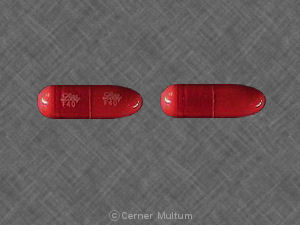Secobarbital Dosage
Applies to the following strengths: 100 mg; 50 mg/mL
Usual Adult Dose for:
Usual Pediatric Dose for:
Additional dosage information:
Usual Adult Dose for Insomnia
100 mg orally once a day at bedtime
Comments:
- This drug may lose effectiveness for sleep induction and maintenance after 2 weeks.
- Short-acting barbiturates may be more effective in producing sleep; however, controlled studies have failed to demonstrate the effects.
- Treatment should be limited to short-term use.
- Patients should ensure that they are able to get a full night's sleep before being active again.
Use: Hypnotic for the short-term treatment of insomnia
Usual Adult Dose for Sedation
Preoperative: 200 to 300 mg orally ONCE 1 to 2 hours before surgery
Comment: This drug has little analgesic effect at subanesthetic doses.
Use: Preanesthetic/preoperative sedation
Usual Pediatric Dose for Sedation
Pediatric patients:
Preoperative: 2 to 6 mg/kg orally ONCE
- Maximum dose: 100 mg/dose
Comment: This drug has little analgesic effect at subanesthetic doses.
Use: Preanesthetic/preoperative sedation
Renal Dose Adjustments
Dose adjustment(s) may be required; however, no specific guidelines have been suggested. Caution recommended.
Liver Dose Adjustments
Mild to moderate liver dysfunction: Dose adjustment(s) may be required; however, no specific guidelines have been suggested. Caution recommended.
Severe liver dysfunction: Contraindicated
Patients with premonitory signs of hepatic coma: Not recommended.
Dose Adjustments
Elderly and/or debilitated patients: Dose adjustment(s) may be required; however, no specific guidelines have been suggested. Caution recommended.
Withdrawal regimens: Cautious and gradual withdrawal of this drug should be performed over an extended period. The manufacturer product information should be consulted regarding recommendations for specific dosing regimens.
Precautions
CONTRAINDICATIONS:
- Hypersensitivity to the active component, barbiturates, or any of the ingredients
- Patients with a history of manifest/latent porphyria
- Patients with a respiratory disease in which dyspnea/obstruction is evident
- Patients with marked liver dysfunction
Consult WARNINGS section for additional precautions.
US Controlled Substance: II
Dialysis
Data not available
Other Comments
Administration advice:
- This drug should not be taken with/right after a meal.
General:
- Doses should be individualized, and should be determined by the patient's age, weight, and condition.
Monitoring:
- HEMATOLOGIC: Periodic blood counts in patients receiving prolonged treatment
- HEPATIC: Periodic liver function tests in patients receiving prolonged treatment
- RENAL: Periodic renal function tests in patients receiving prolonged treatment
Patient advice:
- This medicine may increase the risk of suicidal thoughts and behavior. Patients should be alert for the emergence or worsening of symptoms of depression, any unusual changes in mood or behavior, or the emergence of suicidal thoughts, behavior, or thoughts about self-harm. Patients should report any behavior of concern to their healthcare provider as soon as possible.
- This drug may cause drowsiness, dizziness, and/or reduced alertness. Patients should not drive a car or operate dangerous machinery until they know how this drug affects them.
- Patients should avoid drinking alcohol or taking other drugs that may cause sleepiness or dizziness while taking this drug until they talk to their healthcare provider.
- Patients should be told to contact their healthcare provider before increasing/decreasing the dose or discontinuing treatment.
- Advise patients to speak to their healthcare provider if they become pregnant, intend to become pregnant, or are breastfeeding.
More about secobarbital
- Check interactions
- Compare alternatives
- Reviews (14)
- Side effects
- During pregnancy
- Drug class: barbiturates
- Breastfeeding
Patient resources
Other brands
Professional resources
Other brands
Related treatment guides
See also:
Further information
Always consult your healthcare provider to ensure the information displayed on this page applies to your personal circumstances.


